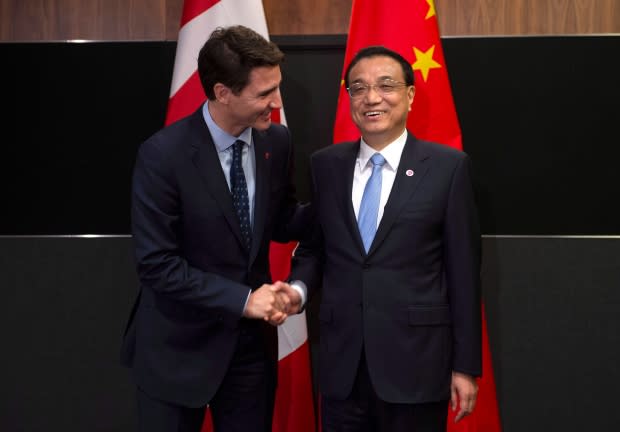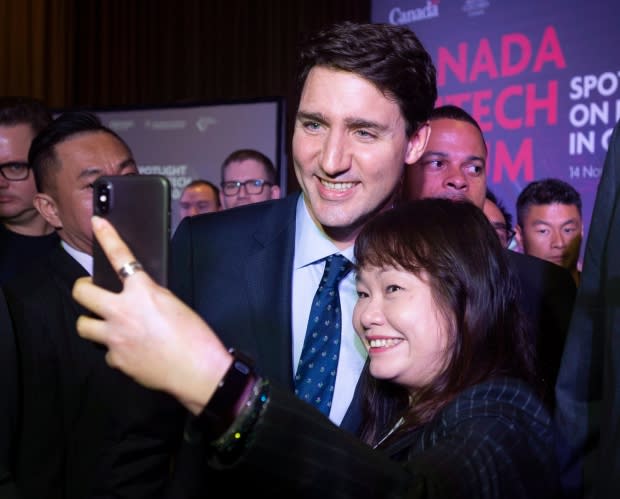Trudeau and Chinese premier reveal progress, even without formal trade talks
Canada may not be in comprehensive trade negotiations with China, but a laundry list of outcomes from Prime Minister Justin Trudeau's hour-long meeting with Chinese Premier Li Keqiang on Wednesday hints at what may be accomplished even without official talks.
Canada also hopes to start official negotiations on a trade agreement with the Association of Southeast Asian Nations by next spring, Trudeau told a working luncheon at ASEAN's annual summit in Singapore.
"We are meeting on the heels of some very successful economic meetings in Beijing," Trudeau told Li, China's head of government, as the two were photographed ahead of the first meeting.
"We will continue to talk in a frank and open way about ... issues that are important to people in both our countries."
Canada and China may not have agreed on how to proceed with a comprehensive trade negotiation, but facts on the ground suggest similar work is already underway on several fronts.
In a statement released several hours after the leaders' meeting concluded, Canada's statement noted that the two leaders had a "frank and open discussion on human rights, freedom of expression, and freedom of religion." Trudeau raised concerns about the treatment of Uyghurs and other minorities in Xinjiang, it said.
The pair also discussed regional security issues, such as the denuclearization of North Korea, it said. The ongoing crisis affecting the Rohingya in Myanmar also came up, according to the release.
A joint statement on marine litter called for a reduction in single-use plastics, a reduction in microbeads in beauty products, and more work on recycling and other efforts to keep plastics out of oceans.
Trudeau also thanked Chinese officials for helping Canadian police fight drug trafficking, including the illegal sale of opioids.
Talks in Beijing laid groundwork
This was the third "leaders' dialogue" between Trudeau and Li.
Last weekend, two of Trudeau's ministers — Finance Minister Bill Morneau, and International Trade Diversification Minister Jim Carr — were in Beijing for talks that set the table for the broad range of agreements revealed Wednesday.
Trudeau's trip to Singapore for talks on the margins of the ASEAN summit has resembled more of a trade mission, with an itinerary full of opportunities to meet businesspeople and market Canada's economy abroad.
He delivered a keynote speech in Canada's pavilion at the Singapore FinTech Festival on Wednesday, helping to promote the 20 companies from three provinces that participated.

At last week's China International Import Expo in Shanghai, 48 Canadian companies signed $1.67 billion in commercial deals with Chinese interests. The many aspirations for Canada–China trade laid out in Wednesday's announcement include a goal of doubling Canada's agriculture exports to China by 2025.
"There's been a great deal of progress, but let's remember that trade is not an event. It's not a day. It's a continuum of conversations," Carr told reporters after Trudeau concluded his meeting with Li.
Carr also said the two leaders talked about Canada's work to lead a conversation about reforming the World Trade Organization.
China's a relatively new member, and its membership remains controversial.
Two years ago, the WTO began treating China like a free market economy for things like calculating prices in dumping disputes. Both the U.S. and the European Union believe that's not fair, because China's state-owned companies enjoy advantages that private companies in a true market economy would not have.
China believes it is playing by the rules laid out when it became a member in 2001, and it has complied with WTO decisions that have not gone its way in the years since.
The U.S., now unhappy with the WTO for a host of reasons, has blocked the appointment of new judges to the WTO's appellate body, undermining its ability to arbitrate trade disputes.
Canada hosted a meeting of 13 "like-minded" countries in Ottawa on Oct. 25 to begin work on changes that could eventually be endorsed by all 164 WTO members.
But China and the U.S., the two principal combatants in an escalating protectionist trade war that's disrupting supply chains around the world, are not included, at least to start.
Improvements to the WTO would be "warmly welcomed" by the Chinese, Carr said. Rather than feeling excluded, Canada's approach of starting with the small group of countries and then branching out garnered "considerable support" from Premier Li.
ASEAN negotiations within months?
Singapore's prime minister, Lee Hsien Loong, also met privately with Trudeau on the margins of the ASEAN summit.
Representatives of the two countries exchanged memoranda of understanding on cybersecurity co-operation, and infrastructure and "smart cities."
Because Canada isn't a member of ASEAN, Trudeau was only invited to two events on the official summit calendar Wednesday.
Reporters were not allowed to attend or film the prime minister's remarks at a noon-hour luncheon with the leaders of the 10-country regional trading bloc. But officials shared an audio recording with media travelling with the prime minister this week, to facilitate reporting.

Trudeau said he hoped Canada would be able to "move forward" with plans for a Canada–ASEAN free trade agreement. Exploratory discussions have been underway, but the prime minister suggested those could wrap up by next spring "so we can move forward to negotiation phase."
He also made a pitch for ASEAN support of Canada's bid to win a seat on the United Nations Security Council for 2021.
In the evening, Trudeau attended a gala for not only ASEAN members, but also the additional countries that participate in the East Asia Summit, which typically coincides with ASEAN.
The East Asia Summit — which includes ASEAN countries plus the U.S. (represented here by Vice-President Mike Pence), Russia (President Vladimir Putin attended meetings earlier), China, India, Japan, South Korea, Australia and New Zealand — is becoming an increasingly important forum for the discussion of regional security issues, such as North Korea's nuclear weapons program.
Canada has been lobbying to join the East Asia Summit. But there's no sign these efforts have paid off.

